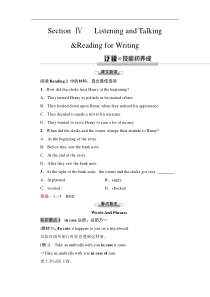 DOC
DOC
【文档说明】19-20 Unit 5 Section Ⅳ Listening and Talking &Reading for Writing-人教版(2019)高中英语必修第三册.doc,共(10)页,145.500 KB,由小喜鸽上传
转载请保留链接:https://www.ichengzhen.cn/view-119393.html
以下为本文档部分文字说明:
SectionⅣListeningandTalking&ReadingforWriting阅读Reading2中的材料,选出最佳选项1.HowdidtheclerkstreatHenryatthebeginning?A.
TheytreatedHenryaspolitelyashetreatedothers.B.TheylookeddownuponHenrywhentheynoticedhisappearance.C.Th
eydecidedtomadeasuittohismeasure.D.TheywantedtoserveHenrytoearnalotofmoney.2.Whendidtheclerksandtheownercha
ngetheirattitudetoHenry?A.Atthebeginningofthestory.B.Beforetheysawthebanknote.C.Attheendofthestory.D.Aftert
heysawthebanknote.3.Atthesightofthebanknote,theownerandtheclerksgotvery.A.frightenedB.angryC.worried
D.shocked答案:1-3BDDWordsAndPhrases知识要点1incase以防;以防万一(教材P54)Incaseithappenstoyouonatripabroad.以防在国外旅行时你也遇到这种事
。[例1]Takeanumbrellawithyouincaseitrains.=Takeanumbrellawithyouincaseofrain.带上伞以防下雨。[例2]Incaseitrains/Incaseofrain,weshould
getourbikesinsidethehouse.我们应该把自行车放在屋里,以防下雨。[造句]如果失火,就赶快向最近的门跑。Incaseoffire,walkquicklytothenearestdoor.[知识拓展]incase以防;万一inc
aseof万一„„;如果发生„„inanycase无论如何;总之innocase决不inthat/thiscase如果是那/这样的话;在那/这种情况下asisoftenthecase这是常有的事[提示](1)incase可用作连词,引导从句,也可以单独使用,常位于句末,相当
于一个副词。(2)innocase位于句首时,句子用部分倒装。(3)当case作先行词且在定语从句中作状语时,要用where引导定语从句。[即学即练](1)用inthatcase,incase,incaseof,asisoftenthecase填空①(201
8·6月浙江卷)IheldtheropetightlyincaseImightfalloff.②Asisoftenthecasewithotheroldpeople,mygrandfatherisfondoftalkingaboutgoodolddays.③Themeetingwi
llbeputoffincaseoftherain.④Enoughspaceshouldbegiventothekids.Inthatcase,theywillgetmorelifeexperiences.(2)句式升级Weshouldinnoc
asedoanythingthatgoesagainsttheinterestsofpeople.→Innocaseshouldwedoanythingthatgoesagainsttheinterestsofpeople.(倒装句)知识要点2hesitatevi.犹豫;踌躇;迟疑;顾虑(教材P
55)WhydoestheownerthinkHenryhesitatestopaythebill?主人为什么认为享利付账时犹豫了?[例1]Agentlemanpassesandhesitatesforamoment.这时有位先生从这儿路过,他
迟疑了片刻。[例2]IfthereissomethingelseIcandoforyou,pleasedon'thesitatetocontactme.如果有其他我可以为你做的,请毫不犹豫地跟我联系。[造句]我毫不犹豫地接受了这个职位。
Ididn'thesitatetoacceptthepost.[知识拓展](1)hesitateabout/oversth.对某事感到犹豫不决hesitatetodosth.对做某事感到犹豫不决don'thes
itatetodosth.不要犹豫做某事(2)hesitationn.踌躇;犹豫withouthesitation毫不犹豫地havenohesitationindoingsth.毫不犹豫地做某事[即学即练]单句语法填空①Shehesitatedtospend(spend)somuchmoney
onsuchadress.②Ididn'thesitateforamomentabout/overtakingthejob.③Hedrivedintotheriverandsavedthedrowningchildwithouthesitation(hesitate).④S
incethen,Ihavenothesitatedtobe(be)inthepresenceofothers,especiallywhentheyneedcompany.⑤Pleasehavenohesita
tioninwritingtomeifyouwantmetodosomethingforyouinChina.知识要点3permissionn.准许;许可;批准;许可证(教材P58)I'dloveto...withyourpermission.我喜欢„„你的准许。[例1]Whoga
veyoupermissiontoleaveclassearly?谁允许你早退的?[例2]Withyourpermission,Iwillcarryouttheprojectassoonaspossible.如
果你答应的话,我将尽快展开这项计划。[造句]你应该知道未经许可不可以给这些展品拍照。Youshouldknowthatnophotosaretobetakenoftheexhibitswithoutpermitting.[知识拓展](1)
permitv.许可;允许n.许可证;执照permitsb.todosth.允许某人做某事permitdoingsth.允许做某事(2)adrivingpermit驾驶执照(3)permissionn.
[U]允许;许可with/withoutone'spermission获得某人同意/未经某人允许askforpermission请求允许[联想发散]动词permit的常见用法为:permitdoingsth./sb.to
dosth.,用法类似的动词还有:①allowdoingsth./sb.todosth.允许(某人)做某事②forbiddoingsth./sb.todosth.禁止(某人)做某事③advisedoingsth./sb.todosth.建议(某人)做某事④encouragedoingsth./sb
.todosth.鼓励(某人)做某事[即学即练]单句语法填空①Thepartywillbeheldinthegarden,weatherpermitting(permit).②Withherparents'permi
ssion(permit),shejoinedtheboxingclub.③Anyoneisnotpermittedtoleave(leave)theofficebeforethemeetingisover.SentencePatterns重点句式1wouldr
atherdo句式(教材P56)Oh,I'drathernotpayyounow...哦,我宁愿现在不付给你钱„„句式分析:wouldrather+动词原形,意为“宁愿做某事”[例1]Hewouldmuchratherkeepti
meforhishobbies.他宁愿把时间花在自己的爱好上。[例2]Iwouldrathertellhimaboutitmyselfthanlethimfindoutfromotherpeople.我宁肯自己把事情告诉他,也不愿他从别人那里得知这件事。[造句]他宁愿给自己取名“吉祥
”,代表着“吉祥如意”。He'dratherhehadbeennamed“Jixiang”,meaningbeingluckyandhappy.[知识拓展](1)wouldratherdosth.thandosth.woulddosth.ratherthandosth.pre
fertodosth.ratherthandosth.preferdoingsth.todoingsth.宁愿做某事(而)不愿做某事(2)wouldrather+从句一般过去时,表示对现在或将来的
虚拟过去完成时,表示对过去的虚拟[即学即练]单句语法填空①Wouldyouratherstay(stay)athomeorgoouttohaveapicnicwithus?②Wewouldratherourdaughterstayed(stay)athomewithus,butitisherc
hoice,andsheisnotachildanylonger.③Wewouldrathermake(make)deliciousdumplingswithourownhandsthanbuy(buy)someforthem.④
Iwouldratherbelaughed(laugh)atthanquarrelwithhim.⑤Iwouldratheryouhadfinished(finish)yourhomeworkyesterday.⑥Shewouldrath
eryoucame(come)tomorrowthantoday.⑦Iwouldrathersolve(solve)myproblemsalone,whatevertheymaybe.⑧Aliceisa
quietgirl,whopreferstostay(stay)inthelibraryratherthangotoseeamovie.重点句式2asif句式(教材P56)Thenhefoldsthebillandslowlyunfoldsitagain,asiflooki
ngatsomethinghecan'tbelieveisthere.然后他把这张钞票叠上,然后又慢慢地打开,好像在看一件它不相信存在的东西。句式分析:asif“仿佛„„似的,好像„„似的”,也可以用asthough。[例1]Hurryup!Itlooksas
ifthetrainisgoingtomove.快点!看起来火车要开了。[例2]Heopenedhismouthasiftosaysomething.他张开嘴好像要说什么。[造句]好像世界末日到了!Ifseemedasifthewor
ldwasatanend如果所引导的从句表示的情况是真实的或是极有可能发生的情况时,句子要用陈述语气。(2)当说话人所陈述的是不真实的或极少可能发生或存在的情况时,从句用虚拟语气。(3)如果asif引导的从句中的主语和主句的主语相同,且含有be动词,可省略从句主语和b
e动词,这样asif后就只剩下名词、不定式、形容词(短语)、介词短语或分词。[即学即练](1)单句语法填空①ItwasJohnwhobrokethewindow.WhyareyoutalkingtomeasifIhaddone(do)it?②Whenapencilispartlyputint
owater,itlooksasifitwerebroken(break).(2)完成句子①他说话的样子,好像他知道她在哪里似的。Hetalksasifheknewwhereshewas.②你看上去好像你刚见了鬼一样。Youlookasifyouhadseen
aghost.③他那样子就像被雷击了似的。Helooksasifhehadbeenhitbylightning.记叙文之空间顺序——“移步换景”巧解题记叙文中的空间(地点)顺序一般指在同一个时间背景下,不同地点、不同场景发生的事情。“移步换景”是此类记叙文的明显特点,文章中的情节随着地点的更迭变
换而跌宕起伏。因此,此类记叙文中地点多、情节较复杂,阅读此类文章可采用“移步换景”法,即一边阅读、一边标注出在不同地点发生了什么事情,进而从整体上把握全文内容。[高考典例]2018·天津卷·B篇[移步⇨地点更迭变换][换景⇨情节变化发展]地点1
[1]WhenIwas17,IreadamagazinearticleaboutamuseumcalledtheMcNay,oncethehomeofawatercoloristnamedMarianMcNay.Shehadrequestedt
hecommunitytoturnitintoamuseumuponherdeath.OnasunnySaturday,SallyandIdroveovertothemuseum.Sheasked,“Doyouhavethead
dress?”“No,butI'llrecognizeit,therewasapictureinthemagazine.”换景1:鲁莽之行——地点1作者读到一篇文章,于是急匆匆地和好友一起去找杂志中提到的博物馆。(可解第41题)[2]“
Oh,stop.Thereitis!”地点2[3]Themuseumwasfree.Weentered,excited.Agroupofpeoplesittinginthehallstoppedtalkingandstaredatus.[4]“MayIhel
pyou?”amanasked.“No,”Isaid.“We'refine.”Tourguidesgotonmynerves.Whatiftheytalkedalongtimeaboutapaintingyouweren'tthatinterestedin?Sally
hadgoneupstairs.Thepeopleinthehallseemedverynosy(爱窥探的),keepingtheireyesonmewithcuriosity.Whatwastheirproblem?换景2:不速之客——地点2作者到达“博物馆”,“馆“内有人。地点3地点4I
sawsomenicesculpturesinoneroom.SuddenlyIsensedamanstandingbehindme.“Wheredoyouthinkyouare?”heasked.Iturnedsh
arply.“TheMcNayArtMuseum!”Hesmiled,shakinghishead.“Sorry,theMcNayisonNewBraunfelsStreet.”“What'sthisplace?”Iasked,stillconfu
sed.“Well,it'sourhome.”Myheartjolted(震颤).Iracedtothestaircaseandcalledout,“Sally!Comedownimmediately!”换景3:懵懂之中——地点3、4作者发现自己弄错了地方,
来到了别人的家里。(可解第42、43题)换景4:尴尬离开——地点5、6作者尴尬地和女主人搭讪,并呼唤好友下楼,出去之后告诉了好友发生的事。地点5地点6[5]“There'ssomereallygoodstuff(艺术
作品)upthere.”Shesteppeddown,lookingconfused.Ipushedhertowardthefrontdoor,wavingatthefamily,saying,“Sorry,pleaseforgiveus,youha
veareallyniceplace.”Outside,whenItoldSallywhathappened,shecoveredhermouth,laughing.Shecouldn'tbelievehowlongtheyletuslo
okaroundwithoutsayinganything.换景5:心仪之地——地点7作者找到了真正的博物馆,看到了名家名作,但却感到不安。(可解第44题)地点7[6]TherealMcNaywassplendid,butwefeltnervousthewholetimewewereth
ere.VanGogh,Picasso.Thistime,westayedtogether,incaseanythingelseunusualhappened.地点8[7]Thirtyyearslater,awomanapproachedmeina
publicplace.“Excuseme,didyoueverenteraresidence,longago,thinkingitwastheMcNayMuseum?”换景6:事后回顾——地点830年之后作者偶遇一位女性,对方提到作者的那次经历。[8]“Y
es.Buthowdoyouknow?Wenevertoldanyone.”地点9[9]“Thatwasmyhome.Iwasateenagersittinginthehall.Beforeyoucameover,Ineverrealizedwha
tabeautifulplaceIlivedin.Ineverfeltluckybefore.Youthoughtitwasamuseum.Myfeelingsaboutmyhomechangedafterthat.I'vealwayswantedtothank
you.”换景7:无心插柳——地点9作者那次鲁莽之行,改变了当时小女孩对家的感情。(可解第45题)[定区间·细比对]41.WhatdoweknowaboutMarianMcNay?A.Shewasapainter.B.Shewasacommunitylea
der.C.Shewasamuseumdirector.D.Shewasajournalist.42.Whydidtheauthorrefusethehelpfromthemaninthehouse?A.Shedislikedpeoplewhowerenosy.B.Shefeltnervous
whentalkingtostrangers.C.Sheknewmoreaboutartthantheman.D.Shemistookhimforatourguide.43.Howdidtheauthorfeelaboutb
eingstaredatbythepeopleinthehall?A.Puzzled.B.Concerned.C.Frightened.D.Delighted.44.Whydidtheauthordescr
ibetherealMcNaymuseuminjustafewwords?A.Therealmuseumlackedenoughartworktointeresther.B.Shewastooupsettospendmuchti
meattherealmuseum.C.TheMcNaywasdisappointingcomparedwiththehouse.D.Theeventhappeninginthehousewasmoresignifica
nt.45.Whatcouldwelearnfromthelastparagraph?A.Peopleshouldhavegoodtastetoenjoylife.B.Peopleshouldspendmoretimewiththeirfamily.C.Peopletendtobeblindto
thebeautyaroundthem.D.Peopletendtoeducateteenagersatamuseum.41.由题干中的关键词MarianMcNay定位到第一段。根据“换景1”中的“awatercoloristnamedMarianMcNay“可知,MarianM
cNay是一位painter(画家)。42.由题干中的关键词inthehouse可定位到第四段。根据“换景3”中的“Tourguidesgotonmynerves.(导游让我紧张)”可知,“我”把那个人误认为是导游了。43.由题干中的关键词int
hehall可定位到第四段。根据“换景3”中“我”被那些人盯着时的疑惑“Whatwastheirproblem?”及后文中的“stillconfused”可知,“我”感到很困惑(puzzled)。44.由题干中的关键词therealMcNaymuseum可定位到第六段。根据“换景5”可知,作
者和朋友来到真正的McNay博物馆,但是她们一直觉得紧张,害怕又出现先前那种不同寻常的事,由此推断,作者不是重点描述McNay博物馆,而是描述这次突发事件带来的影响。45.由题干中的关键词定位到最后一段,从“换景7”中那位女士的话“
在你造访之前,我从未意识到我住的是个多么美丽的地方”可推知,人们往往对自己身边的美丽视而不见。[答案]41-45ADADC
 辽公网安备 21102102000191号
辽公网安备 21102102000191号
 营业执照
营业执照